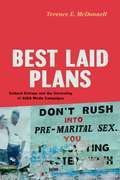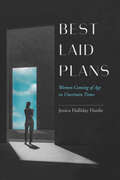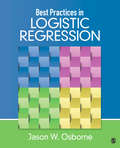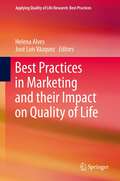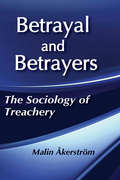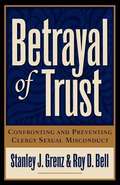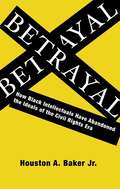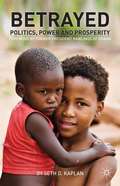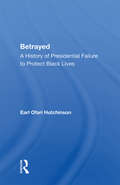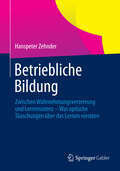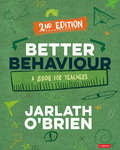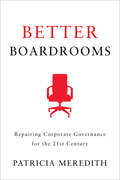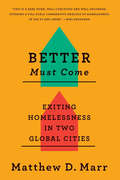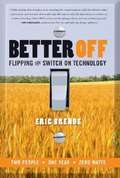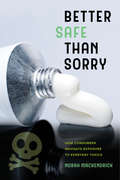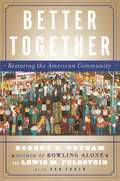- Table View
- List View
Best Laid Plans: Cultural Entropy and the Unraveling of AIDS Media Campaigns
by Terence E. McdonnellWe see it all the time: organizations strive to persuade the public to change beliefs or behavior through expensive, expansive media campaigns. Designers painstakingly craft clear, resonant, and culturally sensitive messaging that will motivate people to buy a product, support a cause, vote for a candidate, or take active steps to improve their health. But once these campaigns leave the controlled environments of focus groups, advertising agencies, and stakeholder meetings to circulate, the public interprets and distorts the campaigns in ways their designers never intended or dreamed. In Best Laid Plans, Terence E. McDonnell explains why these attempts at mass persuasion often fail so badly. McDonnell argues that these well-designed campaigns are undergoing "cultural entropy": the process through which the intended meanings and uses of cultural objects fracture into alternative meanings, new practices, failed interactions, and blatant disregard. Using AIDS media campaigns in Accra, Ghana, as its central case study, the book walks readers through best-practice, evidence-based media campaigns that fall totally flat. Female condoms are turned into bracelets, AIDS posters become home decorations, red ribbons fade into pink under the sun--to name a few failures. These damaging cultural misfires are not random. Rather, McDonnell makes the case that these disruptions are patterned, widespread, and inevitable--indicative of a broader process of cultural entropy.
Best Laid Plans: Women Coming of Age in Uncertain Times
by Jessica Halliday HardieGiven the range of possibilities open to women today, what futures do adolescent girls dream of and pursue? And how do social class and race play into their trajectories? In asking young women about their aspirations in three areas—school, work, and family—Best Laid Plans demonstrates how future plans are framed by notions of gendered responsibilities and abilities. Through her examination of the lives of poor, working-class, and middle-class Black and White young women as they navigate the transition to adulthood, sociologist Jessica Halliday Hardie defines anew what it means for young women to come of age. In particular, Hardie shows how social capital, either possessed or lacked, is not simply a resource for planning for the future but a structure whose form and function varies by social class and race. As these inequalities persist into adulthood, high aspirations, social capital, and careful planning bolster some young women while hindering others. Drawing on qualitative data from a five-year period, Best Laid Plans makes the case for why we need to move beyond the individual appeal to "dream bigger" and "plan better" and toward systematic changes that will put young people’s aspirations within reach.
Best Practices in Hospitality and Tourism Marketing and Management: A Quality of Life Perspective (Applying Quality of Life Research)
by Ana María Campón-Cerro José Manuel Hernández-Mogollón José Antonio Folgado-FernándezThis volume analyses the positive effects that tourism generates on resident’s quality of life, and how this influences tourists’ quality of life as they enjoy an enriching experience in the destination they visit. It provides significant theoretical and empirical contributions, as well as, case studies related to quality of life in hospitality and tourism marketing and management. This volume is the result of the effort that many researchers from all over the world have done to spread some new light on this outstanding research line and add knowledge on the relationship between tourism and quality of life of both residents and tourists. This last is highlighted as a fundamental factor to take into account for the development of new tourism practices. This volume is a true reference for researchers, students and professionals working in tourism marketing and management.
Best Practices in Logistic Regression
by Jason W. OsborneJason W. Osborne’s Best Practices in Logistic Regression provides students with an accessible, applied approach that communicates logistic regression in clear and concise terms. The book effectively leverages readers’ basic intuitive understanding of simple and multiple regression to guide them into a sophisticated mastery of logistic regression. Osborne’s applied approach offers students and instructors a clear perspective, elucidated through practical and engaging tools that encourage student comprehension.
Best Practices in Marketing and their Impact on Quality of Life (Applying Quality of Life Research)
by José Luis Vázquez Helena AlvesThis book is based on the premise that marketing is central to understanding and advancing companies, businesses, countries, major economic areas and every-day problems. It opposes the view held by some social scientists that the positive effects of marketing in a society are a product of capitalist enterprises and that marketing involves excessive exploitation and is a tool for creating and maintaining their power structures. To illustrate its point, the book examines successful marketing practices with implications for consumers' quality of life. Its compilation of cases from all over the world provides a unique and concise review of best practices in marketing and their impact on QOL. Each case in the book presents a specific social problem and discusses details of the marketing strategy adopted to resolve it, as well as the results obtained both for society at large and in terms of the citizens' quality of life. In addition, each case addresses the theoretical background of the specific area of marketing used in the case.
Betrayal and Betrayers: The Sociology of Treachery
by Malin AkerstromBetrayal has a deep fascination. It captures our imagination in part because we have all betrayed or been betrayed, in small or large ways. Despite this there has been little serious work on the subject. It was this absence that inspired this book.As Akerstrom notes, betrayal is something that most people have encountered at some point in their lives. She defines betrayal as a breach of trust, when information is shared beyond an agreed upon boundary of relations, whether that boundary is a pair of friends or a nation. Taking as a point of departure Simmers work on secrets and secrecy, Akerstrom discusses categories of.betrayal, and conditions that influence its intensity. Sometimes the betrayer is seen as a hero and at other times a traitor; and sometimes there are competing loyalties. In certain situations, she reminds us, it is difficult to avoid betrayal or the perception of betrayal. Akerstrom discusses strategies people employ to avoid betraying, ranging from not telling, to making sure one does not know about something in the first place. With deft precision, she clarifies distinctions and in the process broadens our understanding.Initially inspired by insights arising from her research on the criminal informer, for which she had done in-depth interviews, Akerstrom supplements these with interviews with policemen. She has also drawn from her experiences in the field of social work, particularly with women's and crime shelters. Using biographies, autobiographies and a broad range of literature related to spies, World War II, the McCarthy era, and recent literature on whistle-blowing, Akerstrom has defined a fascinating theme. While her illustrations are sometimes dramatic, she hopes that readers will perceive obvious parallels with their own experiences. Social psychologists, sociologists, criminologists, and others interested in secrecy, secrets, and those who betray them to others will find this an unusual and absorbing volume.
Betrayal of Trust: Confronting and Preventing Clergy Sexual Misconduct
by Stanley J. Grenz Roy D. Bell<p>Sexual misconduct by clergy is a devastating issue that reaches across all denominations, damaging the credibility of the church in its wake. The media regularly reports on the moral failure of leaders and abuse at the hands of those who are supposed to be trustworthy. <p>Betrayal of Trust focuses on a common scenario of abuse--sexual involvement between a male pastor and a female congregant--and offers practical solutions on how to respond to and prevent this betrayal of trust. <p>This book presents methods that will help churches respond sensitively to victims and implement policies and procedures to prevent abuse from taking place. For clergy who may be at risk for this behavior, it offers help in establishing appropriate boundaries. <p>This second edition includes a new chapter that offers help for the wandering pastor and a risk-determination questionnaire for pastors who may become abusers.</p>
Betrayal: How Black Intellectuals Have Abandoned the Ideals of the Civil Rights Era
by Houston Baker Jr.Houston A. Baker Jr. condemns those black intellectuals who, he believes, have turned their backs on the tradition of racial activism in America. These individuals choose personal gain over the interests of the black majority, whether they are espousing neoconservative positions that distort the contours of contemporary social and political dynamics or abandoning race as an important issue in the study of American literature and culture. Most important, they do a disservice to the legacy of W. E. B. Du Bois, Martin Luther King Jr., and others who have fought for black rights.In the literature, speeches, and academic and public behavior of some black intellectuals in the past quarter century, Baker identifies a "hungry generation" eager for power, respect, and money. Baker critiques his own impoverished childhood in the "Little Africa" section of Louisville, Kentucky, to understand the shaping of this new public figure. He also revisits classical sites of African American literary and historical criticism and critique. Baker devotes chapters to the writing and thought of such black academic superstars as Cornel West, Michael Eric Dyson, and Henry Louis Gates Jr.; Hoover Institution senior fellow Shelby Steele; Yale law professor Stephen Carter; and Manhattan Institute fellow John McWhorter. His provocative investigation into their disingenuous posturing exposes what Baker deems a tragic betrayal of King's legacy.Baker concludes with a discussion of American myth and the role of the U.S. prison-industrial complex in the "disappearing" of blacks. Baker claims King would have criticized these black intellectuals for not persistently raising their voices against a private prison system that incarcerates so many men and women of color. To remedy this situation, Baker urges black intellectuals to forge both sacred and secular connections with local communities and rededicate themselves to social responsibility. As he sees it, the mission of the black intellectual today is not to do great things but to do specific, racially based work that is in the interest of the black majority.
Betrayed
by Seth D. KaplanBetrayed takes a new approach to the subject of global poverty, one that doesn't blame the West but also doesn't rely on the West for solutions. Betrayed puts the poor themselves at center stage, and shows how their entrepreneurial energies are shackled by political and social discrimination. When these shackles are removed, as is happening in places such as China and Vietnam, the poor are able to seize opportunities and drive wealth creation. Combining the latest research into poverty and state building with the author's personal observations drawn from years running businesses in the developing world, Betrayed explains how leaders in the developing world can build more inclusive societies and more equitable governments, thereby creating dynamic national economies and giving the poor the opportunity to accumulate the means and skills to control their own destinies. This refreshing new approach will appeal to business people who are fed up with reading critiques of global poverty that see capitalism as the problem, not the solution; people in both the global North and South who want to see attention focused not on Western aid but on what developing countries and their citizens can do to help themselves; scholars and practitioners in the development field who are looking for new, practicable ideas; and general readers who want accessible and engaging accounts of ordinary people struggling to overcome poverty.
Betrayed: A History Of Presidential Failure To Protect Black Lives
by Earl Ofari HutchinsonIn this timely and eye-opening book, noted political analyst and media commentator Dr. Earl Ofari Hutchinson traces the root cause of the White House's failure to protect the rights of African Americans. Drawing extensively from public and private presidential papers, private correspondence, personal interviews, and national archive documents, Hutchinson gives a rich historical account of the racial philosophy, policies, and practices of successive presidents from Warren G. Harding to Bill Clinton. Franklin D. Roosevelt is one example. The popular view is that Roosevelt was a Mend to blacks because of his enactment of New Deal programs. But he was also a prisoner of the biased racial thinking of his times. He refused to actively support antilynching legislation and repeatedly curried political favor with racist southern Democrats. Lyndon B. Johnson is yet another example. He is known as a champion of civil rights, but Hutchinson details two crucial moments when Johnson shrank from using the full force of executive power to push Congress to enact new and tougher federal criminal civil rights statutes to punish racist violence. In this book, Hutchinson reveals that no American president has ever signed into law a federal antilynching bill despite a 50-year campaign by the NAACP for presidential and congressional action. He documents how Nixon, Reagan, and Bush rolled back civil rights and affirmative action, failed to fully enforce equal protection provisions of the Fourteenth Amendment against police abuse and racial violence, encouraged conservative legal obstructionism, and fueled the rise of a repressive domestic security state. These actions in turn have reinforced institutionalized racism and continued the historical pattern of devaluing black lives in law and public policy. Finally, Hutchinson warns that the century-old failure by the White House to enforce federal law to protect black lives still has dangerous consequences for American society.
Betriebliche Bildung: Zwischen Wahrnehmungsverzerrung und Lernresistenz - Was optische Täuschungen über das Lernen verraten
by Hanspeter ZehnderErfolgreiche und nachhaltige Bildungsmaßnahmen in Unternehmen erfordern ein gutes Verständnis über das Lernen und das Verhalten von Menschen und Teams. Handlungskompetenz basiert auf subjektiven Wahrnehmungen, welche durch persönliche Lerngeschichten geprägt werden. Ein gutes Verständnis dieser Wirkungskette ist die Basis für die Entwicklung von Ausbildungskonzepten. Mit der Nachbildung einer optischen Täuschung wird hier ein Modell vorgestellt, welches erstaunliche Erkenntnisse über unsere Wahrnehmung und über Wahrnehmungsverzerrungen liefert. So können betriebliche Bildungsmaßnahmen effizient und erfolgreich geplant werden.
Betriebliche Gesundheitsförderung: Das Praxishandbuch für den Mittelstand
by Simon HahnzogGesunde Mitarbeiter in gesunden Unternehmen sparen ihrem Arbeitgeber nicht nur enorme krankheitsbedingte Kosten ein, sondern sind zudem motiviert, leistungsfähig und produktiv. Für Führungskräfte, Personalverantwortliche und Entscheider in klein- und mittelständischen Unternehmen ist es daher heute unerlässlich, sich der Herausforderung Betriebliche Gesundheitsförderung zu stellen oder bestehende Maßnahmen durch neuen Input zu verbessern. 24 Experten aus unterschiedlichsten Arbeitsschwerpunkten repräsentieren die Vielfalt der Handlungsfelder, in denen sich Betriebliche Gesund-heitsförderung gestalten lässt. Ihre Beiträge bieten fundierte Anregungen und praxisorientierte Unterstützung für die Implementierung gesundheitsfördernder Maßnahmen. Best-Practice-Beispiele aus vier mittelständischen Unternehmen veranschaulichen, worauf es dabei unter realen Arbeitsbedingungen ankommt.
Betriebliches Eingliederungsmanagement bei Mitarbeitern mit psychischen Störungen
by Ina Riechert Edeltrud HabibDieses Buch unterstützt Personal- und Fallmanager, Interessen- und Schwerbehindertenvertretungen sowie Gesundheitsbeauftragte in Unternehmen dabei, die betriebliche Wiedereingliederung von Mitarbeitern nach psychischen Krisen zu steuern und sich durch Schwierigkeiten und Rückschläge nicht entmutigen zu lassen. Es liefert konkrete Handlungsempfehlungen, reale Fallbeispiele, Expertenkommentare eines Juristen und hilft, die Chancen des ,,Betrieblichen Eingliederungsmanagements" (BEM) zu erkennen und zu nutzen.
Betriebliches Gesundheitsmanagement mit System: Ein Praxisleitfaden für mittelständische Unternehmen
by Martin Simmel Willy GraßlDieses Buch liefert praktisches Handwerkszeug für ein betriebliches Gesundheitsmanagement (BGM) in mittelständischen Unternehmen – und Argumente, warum BGM mehr als sporadische Gesundheitstage umfasst und für die Zukunftsfähigkeit des Mittelstands von hoher Bedeutung ist. Neben konkreten Handlungstipps für Unternehmensführungen und Anleitungen für eine systematische, auf Vernetzung basierende Herangehensweise, werden reale Fallbeispiele präsentiert sowie Fallstricke aufgezeigt. So kann BGM zum zentralen Managementprinzip im Mittelstand gemacht werden.
Betriebliches Gesundheitsmanagement und Führung
by Karin Struhs-WehrAuf der Grundlage wissenschaftlicher Modelle gibt das vorliegende Buch im Sinne eines kompakten Handbuchs einen praxisnahen Überblick und Einblick in die Themen der ganzheitlichen betrieblichen Gesundheitsförderung wie gesundheitsorientierte Führung, ganzheitliches Stressmanagement, Konfliktbewältigung und Unterstützung psychisch überbeanspruchter Mitarbeiter. Alle Themen werden mit einer Vielzahl praktischer Fallbeispiele und hilfreicher Tools, wie z. B. Checklisten, Gesprächsleitfäden, Übersichten in Form von Tabellen und Abbildungen dargestellt. Schlussendlich beschreibt ein kompakter Leitfaden, wie betriebliches Gesundheitsmanagement die Gesundheit nachhaltig fördern, steuern und wie es im Unternehmen umgesetzt werden kann.
Betriebliches Gesundheitsmanagement: Ein Lehrbuch für Bachelor- und Masterstudierende sowie Berufstätige
by Michael TreierDas Lehrbuch vermittelt theoretisches und praktisches Wissen zum Betrieblichen Gesundheits- und Präventionsmanagement (BGM). Nach einer Einführung werden Gründe für die Implementierung von BGM u.a. aus rechtlicher Sicht erarbeitet. Darauf aufbauend werden die theoretischen Grundlagen des BGM aus betriebswirtschaftlicher, gesundheits- und arbeitswissenschaftlicher Sicht dargestellt. Anschließend werden das Organisationsmodell des BGM und die Zusammenarbeit der betrieblichen Gesundheitsakteure erläutert. Anhand von Handlungsfeldern der Verhaltens- und Verhältnisprävention, wie z.B. Bewegung, Stressbewältigung, gesunde Führung, Aufgaben- und Arbeitsgestaltung, werden typische Vorgehensweisen in der Gesundheits- und Präventionsarbeit erläutert – dabei werden auch neue Trends wie digitale Ansätze im BGM berücksichtigt. Flankiert werden diese Handlungsfelder durch Kontextfaktoren wie Gesundheitspolitik, Gesundheitskultur und Gesundheitskommunikation. Anschließend wird auf die Legitimation und Qualitätssicherung im BGM eingegangen, um den Nachweis des Nutzens von BGM aufzuzeigen. Den Abschluss bilden die Schlüssel- und Erfolgsfaktoren des BGM und ein Ausblick auf zukünftige Trends.
Betriebliches Kompetenzmanagement im demografischen Wandel: Orientierung für Wissenschaft und Praxis (Kompetenzmanagement in Organisationen)
by Inga Truschkat Axel Zweck Ralf Knackstedt Roger HäußlingDie in diesem Fachbuch präsentierten Orientierungshilfen ermöglichen einen Überblick über die große Vielfalt der in Wissenschaft und Praxis in den letzten Jahren entwickelten Problemlösungen für das betriebliche Kompetenzmanagement. Als Leserin oder Leser lernen Sie Werkzeuge kennen, um für das Kompetenzmanagement relevante Lösungsansätze zu identifizieren, wichtige Trends zu erkennen und den in der eigenen Organisation erreichten Entwicklungsstand kritisch zu reflektieren. Die präsentierten Ansätze zeigen Synergiepotenziale zwischen wissenschaftlichen Erkenntnissen und praktischen Methoden auf und helfen Ihnen daher sowohl in der wissenschaftlichen Forschung wie auch in der Praxis.
Better Behaviour: A Guide for Teachers (Corwin Ltd)
by Jarlath O′BrienWhat does it take to improve the behaviour of the children you teach? This second edition of Jarlath O’Brien’s insightful, practical guide for teachers, and those training to teach, combines psychological research, authentic classroom experience and the lessons learned from improving behaviour in schools. You will be challenged to think about your own practice, question accepted orthodoxies and to develop an empowered and confident approach to improve the behaviour of the children you teach. This new edition includes: · A new chapter on how to work with a class where behaviour isn’t good enough · New, expanded discussion of bullying · A new ‘How would you deal with this situation?’ feature exploring tricky scenarios · A new interview feature offering useful perspectives from early career teachers · A new further reading feature so you can explore selected topics in more depth
Better Behaviour: A Guide for Teachers (Corwin Ltd)
by Jarlath O′BrienWhat does it take to improve the behaviour of the children you teach? This second edition of Jarlath O’Brien’s insightful, practical guide for teachers, and those training to teach, combines psychological research, authentic classroom experience and the lessons learned from improving behaviour in schools. You will be challenged to think about your own practice, question accepted orthodoxies and to develop an empowered and confident approach to improve the behaviour of the children you teach. This new edition includes: · A new chapter on how to work with a class where behaviour isn’t good enough · New, expanded discussion of bullying · A new ‘How would you deal with this situation?’ feature exploring tricky scenarios · A new interview feature offering useful perspectives from early career teachers · A new further reading feature so you can explore selected topics in more depth
Better Boardrooms: Repairing Corporate Governance for the 21st Century
by Patricia MeredithThis is the third of three books authored by award-winning author Patricia Meredith. Her first book, Catalytic Governance: Leading Change in the Information Age (co-authored by Steve Rosell and Ged Davis) set out a process for leading transformative change, based on the authors’ experience with the Canadian Task Force for the Payments System Review. Her second book, Stumbling Giants: Transforming Canada’s Banks for the Information Age (winner of the 2018 Donner Prize and co-authored with James Darroch) highlighted how ill-prepared the Canadian banks are for the technology tsunami overtaking financial services. To regain their reputation as vibrant enablers of economic growth, Better Boardrooms proposes that a broad cross-section of Canadians – policy makers and regulators, customers, suppliers, investors, and, not least, bankers themselves – work together to create a banking system better suited to the twenty-first century. This new model of governance is based on a collaborative approach which ensures all relevant voices are heard. As boundaries between industries blur and stakeholders gain greater access to information, it is vital that policymakers and regulators, customers and suppliers, investors and managers work together to fix broken boardrooms.
Better Customer Service: Simple Rules You Can Apply Today
by Edward C. Brewer Terence L. HolmesThis readable and concise research-based book discusses seven simple rules that will help businesses and individuals improve their customer satisfaction and workplace environments – and make the world a little better and more pleasant. An author team with extensive cross-sector experience provides a foundation that will help improve customer service no matter the type of organization or situation, allowing customization according to industry standards and expectations. Although the basic steps are simple – going all the way back to preschool and kindergarten – they can have a significant positive impact on customer service and on basic human interaction. If an employee follows these simple steps, not only will relationships with customers improve, but so will relationships with co-workers, increasing overall organizational satisfaction. Readers who adopt the principles in this book may find that their personal relationships improve as well. The primary audience of this work includes any business that desires to improve customer service. However, anyone who works with people will appreciate the conversational tone and specific illustrative examples in this clear and immediately actionable book.
Better Must Come: Exiting Homelessness in Two Global Cities
by Matthew D. MarrIn Better Must Come, Matthew D. Marr reveals how social contexts at various levels combine and interact to shape the experiences of transitional housing program users in two of the most prosperous cities of the global economy, Los Angeles and Tokyo. Marr, who has conducted fieldwork in U.S. and Japanese cities for over two decades, followed the experiences of thirty-four people as they made use of transitional housing services and after they left such programs. This comparative ethnography is groundbreaking in two ways--it is the first book to directly focus on exits from homelessness in American or Japanese cities, and it is the first targeted comparison of homelessness in two global cities.Marr argues that homelessness should be understood primarily as a socially generated, traumatic, and stigmatizing predicament, rather than as a stable condition, identity, or culture. He pushes for movement away from the study of "homeless people" and "homeless culture" toward an understanding of homelessness as a condition that can be transcended at individual and societal levels. Better Must Come prescribes policy changes to end homelessness that include expanding subsidized housing to persons without disabilities and experiencing homelessness chronically, as well as taking broader measures to address vulnerabilities produced by labor markets and housing markets, as well as the rapid deterioration of social safety nets that often results from neoliberal globalization.
Better Off: Flipping the Switch on Technology
by Eric BrendeIn this social experiment, author Brende and his wife live in a primitive and remote community and rid their lives of anything motorized or electric. Describes how the author feels that such a life can decrease stress and increase one's happiness and health.
Better Safe Than Sorry: How Consumers Navigate Exposure to Everyday Toxics
by Norah MacKendrickHow toxic are the products we consume on a daily basis? Whether it’s triclosan in toothpaste, formaldehyde in baby shampoo, endocrine disruptors in water bottles, or pesticides on strawberries, chemicals in food and personal care products are of increasing concern to consumers. This book chronicles how ordinary people try to avoid exposure to toxics in grocery store aisles using the practice of “precautionary consumption.” Through an innovative analysis of environmental regulation, the advocacy work of environmental health groups, the expansion of the health-food chain Whole Foods Market, and interviews with consumers, Norah MacKendrick ponders why the problem of toxics in the U.S. retail landscape has been left to individual shoppers—and to mothers in particular. She reveals how precautionary consumption, or “green shopping,” is a costly and time-intensive practice, one that is connected to cultural ideas of femininity and good motherhood but is also most available to upper- and middle-class households. Better Safe Than Sorry powerfully argues that precautionary consumption places a heavy and unfair burden of labor on women and does little to advance environmental justice or mitigate risk.
Better Together
by Robert D. Putnam Donald J. Cohen Lewis FeldsteinIn his acclaimed Bowling Alone, Robert Putnam describes the United States as a nation in which we have become increasingly disconnected from one another and in which our social structures have disintegrated. But in the final chapter of that book he detects hopeful signs of civic renewal. In Better Together Putnam and coauthor Lewis Feldstein tell the inspiring stories of people who are reweaving the social fabric by bringing their own communities together or building bridges to others. Better Together examines how people across the country are inventing new forms of social activism and community renewal. An arts program in Portsmouth, New Hampshire, brings together shipyard workers and their gentrified neighbors; a deteriorating, crime-ridden neighborhood in Boston is transformed by a determined group of civic organizers; an online "virtual" community in San Francisco allows its members to connect with each other as well as the larger group; in Wisconsin schoolchildren learn how to participate in the political process to benefit their town. As our society grows increasingly diverse, say Putnam and Feldstein, it's more important than ever to grow "social capital," whether by traditional or more innovative means. The people profiled in Better Together are doing just that, and their stories illustrate the extraordinary power of social networks for enabling people to improve their lives and the lives of those around them.
